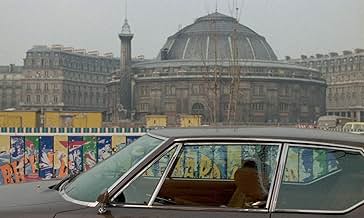Sigismond has a relationship with his wife. On a Paris trip, he becomes obsessed with a prostitute resembling his wife. His interference with her pimp leads to a beating. Receiving news of h... Read allSigismond has a relationship with his wife. On a Paris trip, he becomes obsessed with a prostitute resembling his wife. His interference with her pimp leads to a beating. Receiving news of his wife and son's death, he's devastated.Sigismond has a relationship with his wife. On a Paris trip, he becomes obsessed with a prostitute resembling his wife. His interference with her pimp leads to a beating. Receiving news of his wife and son's death, he's devastated.
Camille Larivière
- Young Prostitute
- (as Camille Lariviere)
Désiré Bastareaud
- Le nain noir
- (uncredited)
Roger Darton
- Un client de la boîte
- (uncredited)
- Director
- Writers
- All cast & crew
- Production, box office & more at IMDbPro
Storyline
Did you know
- TriviaIn her autobiography, "Nue", Sylvia Kristel said that this was probably her favorite acting role, and that she found it a shame that not a lot of people saw it at the cinema.
- Alternate versionsThe Director's Cut released in Germany on Blu-ray runs almost six minutes longer than the French theatrical version. Both versions contain scenes missing in the other version, as well as alternative versions of Sigimond washing himself in the bathroom and of the scene where Sigimond and Diana play with the egg. The Director's Cut also shows additional scenes in which Sigimond's chambermaid is fascinated by him and unsuccessfully tries to seduce him. The additional scenes of the Director's Cut nicely round off the film. Some of the additional scenes of the Director's Cut come from the German theatrical version and are slightly lower in quality. Presumably, they had access to a 35mm scan here. At one point, they even seem to have resorted to a VHS. In the scenes towards the end when Sigimond is driving in the car, only the French audio is heard, as these scenes were never present in the German version of the film. Optional German subtitles are provided for these scenes. Runtimes: French theatrical version: 86:11 min. Director's Cut: 91:53 min.
- ConnectionsFeatures Pépé le Moko (1937)
Featured review
La Marge, directed by Walerian Borowczyk, is an unusual film that blends art-house cinema with erotica, resulting in a thought-provoking yet sensual experience. It explores the subtle ways emotions are conveyed through body movement, particularly in the context of sexual encounters and the notion that the type of orgasm one experiences with a partner can indicate the depth of their love.
The film focuses on a sex worker, Diana, and the story is told through a unique soundscape that emphasizes ambient noises and music over dialogue. The wind, juke box tunes, and everyday sounds like eating and cleaning create an atmospheric backdrop to the visuals. The cinematography is mobile and sensitive, capturing the environment and characters effectively. The film has a personal and artistic feel, and its slow pace and subtle symbolism add to its enigmatic appeal.
However, the film's obscure nature might be off-putting to some. La Marge sits in an uncomfortable middle ground, perhaps too conventional for fans of the director's early work, yet too restrained for those accustomed to his later releases. The film's exploration of sex and its links to guilt, persecution, and death might be expected themes for those familiar with Borowczyk's work, but they are presented in a more subtle and restrained manner here.
La Marge is an intriguing, if somewhat perplexing, film. It is a unique and personal work of art, but its slow pace, ambiguous symbolism, and focus on subtle emotional cues may make it inaccessible to viewers who prefer more straightforward storytelling.
La Marge is an acquired taste, much like the director's other works, but it leaves a lingering impression, inviting reflection on the relationship between art, sexuality, and human emotion.
The film focuses on a sex worker, Diana, and the story is told through a unique soundscape that emphasizes ambient noises and music over dialogue. The wind, juke box tunes, and everyday sounds like eating and cleaning create an atmospheric backdrop to the visuals. The cinematography is mobile and sensitive, capturing the environment and characters effectively. The film has a personal and artistic feel, and its slow pace and subtle symbolism add to its enigmatic appeal.
However, the film's obscure nature might be off-putting to some. La Marge sits in an uncomfortable middle ground, perhaps too conventional for fans of the director's early work, yet too restrained for those accustomed to his later releases. The film's exploration of sex and its links to guilt, persecution, and death might be expected themes for those familiar with Borowczyk's work, but they are presented in a more subtle and restrained manner here.
La Marge is an intriguing, if somewhat perplexing, film. It is a unique and personal work of art, but its slow pace, ambiguous symbolism, and focus on subtle emotional cues may make it inaccessible to viewers who prefer more straightforward storytelling.
La Marge is an acquired taste, much like the director's other works, but it leaves a lingering impression, inviting reflection on the relationship between art, sexuality, and human emotion.
- MajesticMane
- Jun 17, 2024
- Permalink
- How long is The Margin?Powered by Alexa
Details
- Runtime1 hour 28 minutes
- Sound mix
- Aspect ratio
- 1.66 : 1
Contribute to this page
Suggest an edit or add missing content

























